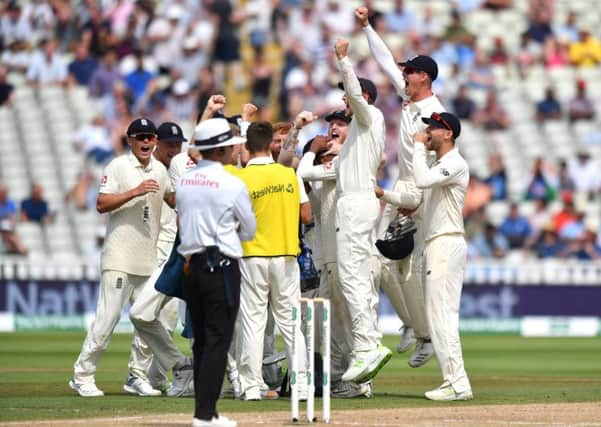Chris Waters: Dumbing down game at every opportunity is not the answer


So tweeted Paul Newman, cricket correspondent of the Daily Mail, straight after the thrilling first Test between England and India.
It encapsulated perfectly what most people seem to think about the prevailing situation – namely that nothing beats top-quality Test cricket and that The Hundred is arguably the worst idea since Abraham Lincoln announced in 1865: “I think I’ll go to the theatre tonight.”
Advertisement
Hide AdAdvertisement
Hide AdLincoln, as you will remember, was shot dead for his trouble, which is precisely the fate that most would have for the 100-ball competition.
Most, that is, apart from the England and Wales Cricket Board themselves and now, apparently, the MCC, whose world cricket committee last week announced that they were “reassured” that the new competition would “still be a recognisable form of cricket”.
Well that’s okay then.
Panic over.
Not.
But as we marvel at the myopia of an MCC committee that comprises such normally sage figures as chairman Mike Gatting, Ricky Ponting and Kumar Sangakkara, to whom it was confirmed by the ECB that six-ball overs are set to be scrapped and substitute fielders used as a tactic, let us not lose sight of the beauty of Test cricket.
The closing stages at Edgbaston were almost as thrilling as the Ashes climax there in 2005, a Test match often described as the greatest of them all.
Advertisement
Hide AdAdvertisement
Hide AdThere were no gimmicks on show at Edgbaston last week, no five-ball overs, no substitute fielders coming and going.
Nor was there anyone inclined to leave the stadium or, at home, to switch off their television, radio or tablet, with one and all gripped by the unfolding drama as England squeezed home by 31 runs.
Ah, yes, “television”...
While the Test match was in progress, George Dobell, senior correspondent at ESPNcricinfo, also took to Twitter to state: “I’ve no idea who will win this game. But of this I’m certain: if this match (and all the others like it) were broadcast free-to-air cricket would have no popularity issue in England.”
At the time of writing this tweet had received almost 4,000 likes with Dobell going on to assert that “cricket needs the oxygen of publicity” – the key factor it enjoyed when I and countless others were growing up and could switch on free-to-air television to hear the dulcet tones of Richie Benaud, Tom Graveney, Jim Laker et al, which was my own introduction to the Test match game.
Advertisement
Hide AdAdvertisement
Hide AdInstead the best that our administrators can come up with is a new concept that few, if any, fans want in an effort to attract a new audience that they freely admit does not like the game, while all the time dumbing down the sport at every opportunity.
Of course not every cricket fan likes Test cricket, which is absolutely fine.
Many people just like T20 and/or 50-over cricket. But the decision to take cricket off free-to-air TV, allied to the ECB’s scrambling efforts to play T20 catch-up with the rest of the world, are continuing to have calamitous effects.
For, as proved by events at Edgbaston, there is a tremendous appetite for cricket in this country, if only those who run the sport would actually recognise it and nurture it properly.